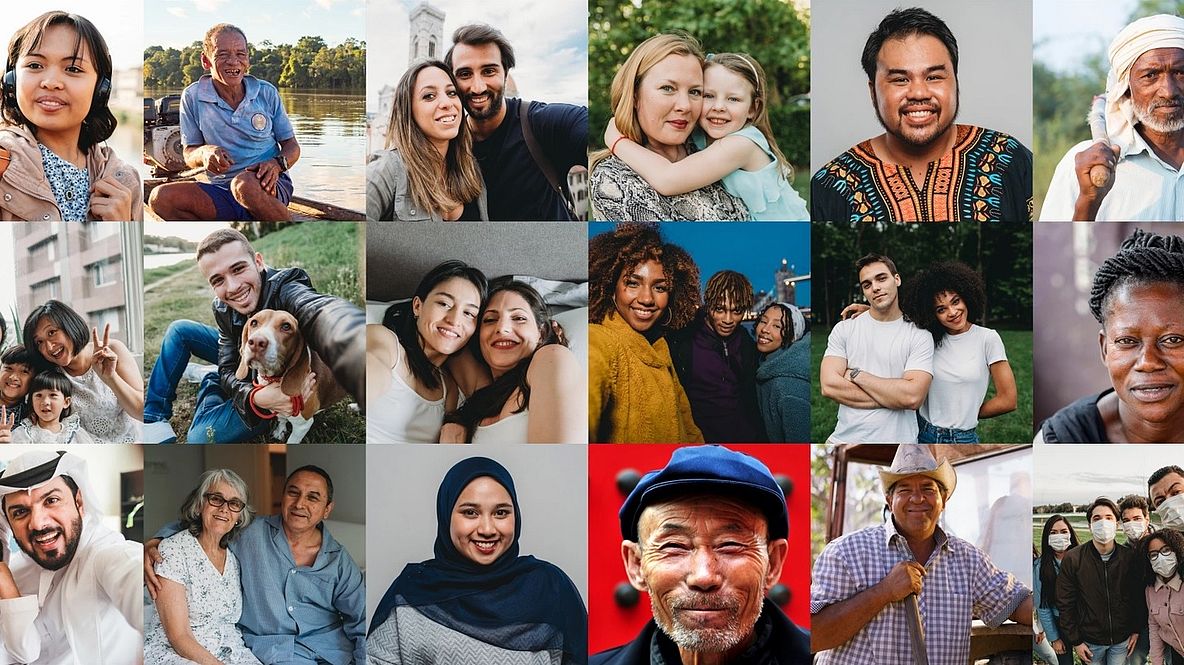Global Assembly demands climate action

In a declaration, members of the first Global Climate Assembly call on countries, governments and people around the world to make every effort to drastically reduce global emissions of climate-damaging gases and limit global warming to 1.5°C. This declaration to uphold the Paris Climate Agreement was read out by participants of the Global Assembly, including workers from India, China and the Democratic Republic of the Congo, at the UN Climate Summit COP26 in Glasgow on 1 November 2021.
For this global citizens' assembly, 100 people from all over the world had been randomly selected to present a plan to combat climate change to world leaders. The assembly was composed in such a way that it corresponded to the world's population in terms of age, gender, ethnicity and income.
Information from experts
Participants spent 68 hours together online over eleven weeks between 7 October and 18 December 2021 to understand the climate and environmental crisis, consider possible future scenarios and develop principles to guide policy makers. They were briefed by international experts on the topic of climate change in order to deliberate among themselves. Based on this information, the Citizens' Assembly members had drafted the statement published on 1 November 2021. The final recommendations have been decided on 18 December 2021.
In their declaration, the Global Assembly members call for financial support for clean energies instead of fossil fuels. They also call for improving energy efficiency, introducing carbon taxes and addressing the problems of overpopulation and overconsumption.
Global decisions not democratic enough
The strategies to achieve the goals of the Paris Agreement would have to be implemented in accordance with the principles of equality and global justice, recognising different starting points without leaving anyone behind. The largest producers of greenhouse gases would have to lead the fight against climate change. The industrialised countries are called upon to support the developing countries in their climate protection measures.
The way climate change decisions are made today at the global level is neither democratic nor fair enough, according to the members of the Climate Assembly. "Powerful countries and large corporations have a disproportionate influence on the process to the detriment of others," notes the Global Assembly.
"Citizens' assemblies must be expanded"
"It is the legitimate right of people to participate in decisions that affect their lives. Citizen participation processes, such as citizens' assemblies, must be expanded and made an integral part of climate decision-making at the global, regional, national and local levels," the assembly participants demand. The Global Assembly, they said, is a living example of how citizens from around the world, representing the full diversity of humanity, can come together on an important issue like climate change and contribute meaningfully with their collective wisdom.
"The voices of the most affected people and territories must be given more space in climate decision-making, including the voices of least developed countries, disadvantaged social groups, indigenous peoples, women and children, and small farmers," the Climate Assembly recommends.
Climate change undermines human rights
Climate change awareness and citizen participation should be raised through education and the media. Fairness, inclusion and participation create the basis for effective and equitable climate policies.
The Global Assembly also calls for the observance and expansion of the Universal Declaration of Human Rights (UDHR). "Climate change and the ecological crisis undermine human rights as they lead to food insecurity, displacement, poverty, war and disease. The fundamental rights of current and future generations depend on a clean, healthy and sustainable environment. This must be recognised by including a right to a clean environment in the UDHR," the Citizens' Assembly demands.
Declare ecocide a crime
Assembly members recognise that nature has intrinsic value and rights, as stated in the Declaration on the Rights of Mother Earth. The rights of nature, they say, are inseparable from the rights of people, and should be interpreted and applied harmoniously.
Ecocide - the long-term and significant damage or destruction of ecosystems - must be included as a crime in international and national laws, and these must be consistently enforced alongside existing environmental laws, the Global Assembly recommends. To raise awareness of ecocide and the rights of nature, governments would need to promote education and community engagement.
First global citizens' assembly
The Global Assembly, supported by the UN and more than 100 organisations worldwide, was the first global citizens' assembly. The organisers hoped that its results could bring about a breakthrough in the international climate negotiations, which since 2015 have been about setting the "rules" for implementing the Paris Climate Agreement.
"For too long, the international climate debate has been dominated by powerful minorities," said Rich Wilson, founder of the citizen participation initiative Involve. "That has to end. The Global Assembly is the greatest experiment in global democracy ever attempted. It's an ambitious undertaking that matches the crisis we face".
Large-scale plans to overhaul global democracy
The assembly revealed large-scale plans to overhaul global democracy. Host, Susan Nakyung Lee, told delegates: “Our long-term vision for the global assembly project is we have over 10 million people participating annually, becoming a permanent infrastructure of global governance.”
Read more